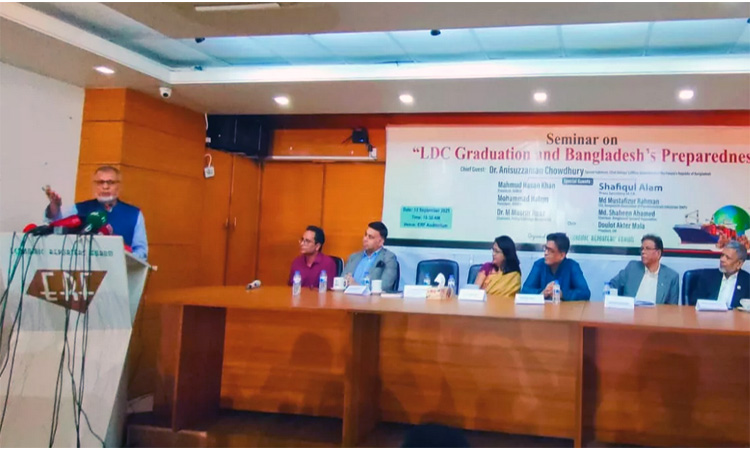News Flash
News Flash

DHAKA, Sept 13, 2025 (BSS)- Chief Adviser’s Special Assistant Dr Anisuzzaman Chowdhury today said that there is no possibility of postponement or backtracking from the country’s drive towards LDC graduation since the country is already ‘flying’ towards that end.
“We’ve no scope for returning back from the path of LDC graduation,” he said while addressing a seminar here today as the chief guest.
Economic Reporters’ Forum (ERF) arranged the seminar on “LDC Graduation and Bangladesh’s Preparedness” in its auditorium.
Chief Adviser’s Press Secretary Shafiqul Alam, BKMEA President Mohammad Hatem, BGMEA Senior Vice President Inamul Haq Khan, Chairman of Policy Exchange Bangladesh Dr M Masrur Reaz, Bangladesh Association of Pharmaceuticals Industry (BAPI) CEO Md Mustafizur Rahman spoke on the occasion as special guests.
Presided over by ERF President Doulat Akter Mala, its general secretary Abul Kashem moderated the event.
Dr Anisuzzaman Chowdhury said the interim government had inherited an economy which was in the ‘ICU’ in August, 2024 with siphoning off around $234 billion abroad during the previous regime.
But, with the passage of time, he said, the foreign exchange reserves have increased thanks to the contributions of the remittance warriors and also to the prudent policies of the government.
When asked whether the government would take any decision to defer the country’s LDC graduation process beyond 2026, he said that it was not under his jurisdiction to take such decision.
The Chief Adviser’s Special Assistant, however, said that no government usually takes any major policy decision before the national election.
He also opined that the private sector can start lobbying through their international partners to defer Bangladesh’s graduation from the LDC status.
Press Secretary to the Chief Adviser Shafiqul Alam said that the stance of the government remained the same on LDC graduation suggesting that the private sector should take risks to do better.
“They (private sector) should have such appetite for taking risks,” he said.
Suggesting the BGMEA for enriching its research operations in line with the global perspectives, Alam said that such initiatives would help the apparel industry leaders to better understand and monitor the global market.
He said that the countries in the Far-East and South-East Asia have transformed their ports as ‘super efficient’ and thus contributing heavily in their economy.
The CA’s Press Secretary also informed that it was obviously under priority of the government to strike agreements with countries like Japan, Singapore, UAE and Malaysia.
BKMEA President Mohammad Hatem noted that discipline has been restored in some areas of the economy during this tenure from the previous one thanks to the wholehearted efforts from the government.
Hatem said that the recently graduated countries had little to lose considering their export volumes, whereas Bangladesh faces the risk of losing a significant portion of its export earnings.
“If the European Union (EU) revises its rules, we may not even qualify for GSP Plus benefits,” he cautioned.
Hatem said although some progress had been made, but Bangladesh still needs at least three more years under a deferral policy.
Chairman of Policy Exchange Bangladesh Dr M Masrur Reaz said Bangladesh is on the track for graduating from the LDC status and it should take place while there is no such necessity to postpone it.
“After reviewing the data, it appears that Bangladesh is not fully ready for graduation. Our food security remains dependent on imports, while the agriculture sector heavily relies on imported fertilizers and pesticides,” he said.
He cautioned that the issue of manipulation in data alone during the previous regime would not be sufficient enough to secure a deferral. Instead, broader macroeconomic vulnerabilities must be presented to justify the deferment of the graduation.
Dr Reaz noted that Bangladesh’s export dependency differs significantly from that of countries like Laos.
“We’re facing an energy crisis driven by import dependence since 2011, and it’s not possible to resolve this issue overnight,” he said.
The eminent economist pointed out that the interim government has begun efforts to stabilise foreign exchange reserves, which were declining by over $700 million per month during the previous AL regime.
Dr Reaz cited that Bangladesh ranks 105th in the Global Competitiveness Index while the competing countries are below 60. The country also needs significant improvement in the Logistics Performance Index and Trade Facilitation Index, he noted.
“Singapore has been trying to engage with us since 2018, but implementation remains a challenge,” he said, adding that Bangladesh’s share in global value chains is only 20–22 percent, compared to Vietnam’s 66 percent.
BGMEA Senior Vice President Inamul Haq Khan said that there is no scope for backtracking from the LDC graduation. But, considering the persisting challenges, he said they have already sought additional three years for getting prepared.
“We think our export sector is definitely not prepared. If we get six years in total till 2032, if we can groom up skilled manpower, overcome our weaknesses and successfully negotiate with our buyers, then we hope to get better results,” he added.
Putting emphasis on diversification of exportable markets and items, the BGMEA Senior Vice President said that all concerned stakeholders need to work together in this regard. Subsidies and incentives are also needed in this sector considering the growing challenges.
BAPI CEO Mustafizur Rahman underscored the need for building skilled human resources and ensuring uninterrupted power and energy supply to keep this sector competitive in the global arena considering the graduation challenges.